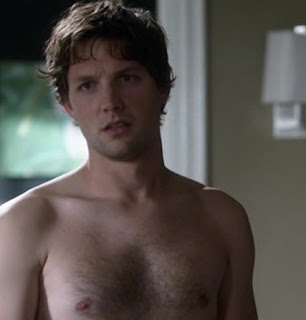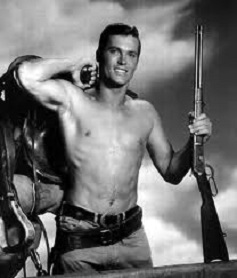Amazon Prime recommends a tv series called
I Love Dick.Well, sure, who doesn't love dick?
I assume that the double-entendre is intentional.
It's about a married couple, Chris (a girl) and Sylvere (a boy), who become obsessed with a hunky professor (Kevin Bacon). So, bisexual three-way?
Kevin Bacon used to be quite a hunk, but I haven't seen him in anything since Sleepers (1995). I wonder what he looks like now.
Sylvere is played by Griffin Dunne, who had a buddy-bonding homoromance in American Werewolf in London (1981). I wonder if he will bring the same gay sensibility to L Love Dick.
One of the episode descriptions mentions a relationship between Trevor and Devon. A gay male couple, unless of course one of them is a girl with a boy's name.
Ok, I'm in.
Prologue: Big bold letters fill the sccreen: "Dear Dick, every letter is a love letter."
Scene 1: New York. Chris and Sylvere are packing ("Where's my copy of Sisyphus?").
Griffin Dunne used to be a hunk. The years have not been kind.
They explain to the subletter that Sylvere got a job at a think tank in Marfa, Texas: "People get invited to read, and write, and think." Chris is going to drop him off and then head to Italy for a film festival.
Ever since my horrirble year in Hell-fer-Sartain, any day when I'm not in...ugh...Texas is a good day. I'm not sure I want to watch a tv series set in the worst place in the world.
Scene 2: They're driving through the sagebrush and sunburn of Middle America, insulting each other: "I'd like to stop at Dollywood, but they don't let you in unless you have enormous tits."
I haven't heard that term for many years. It seems rather old-fashioned. But how would I know -- I don't discuss women's breasts very often.
Scene 3: Establishing montage of Marfai, ugh...Texas. Train, chair in front yard, Spanish adobe architecture, a cowboy riding his horse down Main Street. Huh?
They arrive at a tiny, rundown house with no air conditioning and a vew of run-down trailers. Get back in your car and high-tail it out of...ugh...Texas!
But they unpack. "Where's the lapsang souchong tea?" is a funny line when said amid the squalor.
Uh-oh. Chris geta a text: They are pulling her film from the festival, so she can't go to Venice after all (couldn't she go as a spectator?). So she's stuck in squalor in Marfa...ugh, Texas!
Scene 4: Morning in Marfa. The gas stove doesn't work, so no lapsang souchong tea for breakfast. Chris meets Devon, the young butch woman who lives in the trailer next door and works as a caretaker for the institute. She promises to fix the stove and refrigerator, and advises Chris to wear boots, not sandals. "We got scorpions and rattlers."
Darn, a girl with a boy's name. So Trevor and Devon will be a heterosexual couple.
Scene 5: They walk down the horrible rustic road to the institute, a horrible flat-roofed concrete building with smudged walls. There are a lot of artsy types schmoozing in the courtyard. Chris meets Sookie and Geoff (Adhir Kalyan) a black-South Asian couple, and the only people of color around.
Whoops, they're not a couple. The institute doesn't allow wives/ partners to come with the residents -- too much distraction from the reading, writing, and thinking.
Uh-oh, Chris is in trouble (just go to Italy! Who cares if your film is in the festival?).
Meanwhile, Sylvere starts flirting with a hippie chick bathing her feet in the koi pond. The world's worst pick-up line: "I find too much beatuy anxiety-provoking."
I take that back. His next line is worse: "I came her to write about the Holocaust. There's something new afoot."
Meanwhile, Chris wanders amid the conversations about fracking, poverty, and zumba class, and suddenly sees Dick (Kevin Bacon) sitting by himself, rolling a marijuana cigarette.
The years have kinder to Kevin Bacon than they have to the painful-to-look-at Griffin Dunne, but still,
o tempora, o mores!Chris and Dick make eye contact.
"Dear Dick," she writes, "This is about OBSESSION!"
She approaches and tries an even worse pick-up line than her husband's: "It's interesting that you go by Dick. Most people would stick with Richard. Or Rich, Rick, Richie, Ricky..."
He discovers that she is married and hastily walks away, but she invites him to dinner at 8:00.
Girl, this isn't New York. Dinnertime is at 5:00 pm!
Scene 6: Dressing for dinner. Chris in her underwear, twice! Gross! Sylvere is fully clothed. Heterosexual male gaze double standard.!
They argue about something that I don't understand. "Let's just...I thought we...But...we have to...You don't have to..." Maybe only heterosexual couples get it.
"Dear Dick: There has to be something to look forward to. Otherwise I can't go on living."
Scene 7: The restaurant, which is surprisingly elegant for a horrible small town in...ugh...Texas. I was expecting a Beef and Burp, or an Appleby's.
Chris stares slack-jawed at Dick and tries one stuttering, nervous pick-up line after another, while Sylvere discusses his Holocaust project: "how does the materiality of death transfer to the living, like an airborne contaminant."
Dick then explains why some artists are successful, and others are not: you get what you want. If you don't succeed, you didn't want it badly enough. Right, Chris?
Chris is upset by this, and storms off, leaving Sylvere and Dick to discuss why women filmakers always produce such awful movies.
"Dear Dick," she writes. "Game on!"
Chris returns from the bathroom and announces that she's going to sign up for Dick's class. I didn't know that the institute had classes. I thought they just thought deep thoughts. Ok, but there's no syllabus. Dick doesn't read books: "I'm post idea."
Scene 8: In bed later, Chris thinks about Dick (I'm thinking about dick myself, right now). She gets out her laptop. Sylvere wants to know what she's doing. "Nothing. A short story. A letter. I'm just fucking around." "Read it to me," he demands.
"Dear Dick, I never understood until tonight how one chance meeting can alter the course of someone's life."
But..he insulted your work. He was arrogant. Oh, right, "arrogant" is tv for "sexy."
"When I went into the bathroom, I was waiting for you to follow me, so we could do it."
I would personally be less than thrilled to hear about my partner's obsession with a guy they just met, but Sylvere responds by dropping his pants (butt shot!) and screwing her.
Scene 9: Morning. Dick wakes up alone in his bed (shirtless shot). He sits on his porch and smokes pot. Meanwhile, Chris prints out her "Dear Dick" letter. Dick goes to his pool, takes off his pants (butt shot), and climbs in.
My Verdict: There is no hint of romantic or erotic attraction between Dick and Sylvere. And Devon and Toby are going to be a boy-girl couple. There are no gay or bisexual people here.
But it was more than mere exclusion. I was peering into an alien world, with norms and conventions that I didn't understand. What was the argument in Scene 6 about? Why did Chris continue to like Dick after he insulted her? Why was Sylvere pleased with his wife's interest in another man?
I don't know what's going on, but I know that I'm not in the target audience. This is a show by, for, and about middle-aged married heterosexuals. The 1980s may have been more homophobic, bu they were also allowed for a lot more buddy-bonding gay subtexts.
O tempora, o mores, o crap.
See also: American Werewolf in London































